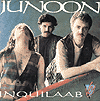



The Power of Rhythm: Junoon
by Jennifer Kho, Mike McPhate, Melis Senerdem
 |
| Junoon with UN Secretary General Kofi Annan on UN Day. (photo courtesy of Junoon) |
The story of Junoon, the rock band that blends traditional sufi music
with western instruments and melodies, has much more than a musical connotation
in Pakistan.
Three young musicians, with different backgrounds (Salman Ahmad, the
lead guitarist a Sunni, singer Ali Azmat a Shi'ite and bass guitarist,
Brian O'Connell, an American) have established a band in 1994 and named
it Junoon, meaning "obsession" or "passion" in Urdu.
With their music, the Sufi poems of 12th and 13th centuries resurrected
and became popular lyrics.
It did not take long for them to become big in Pakistan with their energizing
rhythms and lyrics carrying political messages. As early as in the spring
of 1996, their song "Jazb-e Junoon" (The Spirit of Passion)
became Pakistan's official song for the Cricket World Cup.
But the content of their songs changed the nature of the band's status vis-à-vis the Pakistani government. Their videos were usually bitter satires of the politics in Pakistan. Just to give an example, in the video of "Ehtesaab" (Accountabilitiy), they portrayed a horse dining at a luxury hotel, told to be an obvious dig at the polo ponies of then prime minister Benazir Bhutto's husband, Ali Zadari.
The album that gained Junoon international reputation, "Azadi"
(Free), was released in 1997. The band remained number one in MTV Asia
charts and the three musicians were on their way to perform in India in
April.
|
Hear some of Junoon's songs.
|
They received many awards both in India and Pakistan and "Azadi"
became the best selling album in both countries the next year. During
the very same week in May 1998 that India conducted nuclear tests near
the Pakistani border, 50,000 Junoonis were listening to the peace songs
of their favorite band in New Delhi. The band became one of the main critiques
of both countries' nuclear proliferation policies. Soon after the event,
Junoon was banned in Pakistan.
The group members have occasionally claimed that the police have searched
their houses and they complained about phone taps. They have also received
anonymous death threats.
In interviews with BBC and CNN, members of Junoon spoke out against the
tests: "In a region mired with poverty and destitution, with millions
of starving souls living in pitiful conditions, can we afford a nuclear
arms race?" asked Salman Ahmad, the lead guitarist of the band.
"Would it not be better for India and Pakistan to try to inspire
each other in the areas of education, health, and economic development,
in Pakistan we don't have clean water, health or employment. How can we
afford a nuclear bomb?"
The aftermath of September 11 and the US war in Afghanistan, did not
only put Pakistan as a country at the center of discussions but also Junoon
as the symbol of dissident youth.
The band gave four benefit concerts in New York for the families of the
victims of the World Trade Center. They were invited by the UN to perform
on UN Day (October 24). They played together with the Indian band, Euphoria,
in the gigantic General Assembly Hall.
Salman Ahmad expressed his feelings in an interview: "The twentieth
century has been the most violent century in the history of the human
race - 150 million people died. I feel that in the twenty-first century,
we should make a declaration, and that's why I thought what's the point
of Junoon playing alone. I suggested Euphoria should play along with us
if we wanted this performance to be a sincere appeal for peace. And the
concert was amazing. We played before 189 delegate states - us, two bands
from countries that have fought three wars! This is the side of the UN
I find appealing. The rest of it is just a status symbol which I'm not
too interested in," he explained.
However, Ahmad has a far going role within the UN body. He is the organization's
goodwill ambassador for Pakistan in the fight against AIDS.
On the subject of the war in Afghanistan and Pakistani people's reactions,
the group members identify themselves with "the silent majority"
of the country who, they say "don't have a voice and don't want to
come out on the streets and risk being shot."
Ahmad says that as opposed to this silent majority, the fundamentalist
groups in the country who pour on the streets to demonstrate are a small
minority. But neither does he fall short of criticizing the misperceptions.
In the very same interview, Ahmad is quoted as saying: "If there
are angry voices in the streets of Pakistan, it's not because they resent
the freedoms Americans have. It's a consequence of American foreign policy
in the region."
He says the band pursues a different image for Islam than that of the
fundamentalists.
"the music I've written in Pakistan has been a response to extremism
in one form or the other – violence, or poverty or a cultural identity
crisis. The music on Azaadi (Freedom), Parvaaz (Flight), Inquillab (Revolution)
and, prior to that, Talash (Search) was shaped by experiences living in
a Muslim country," he said about the band's albums. Junoon has also
organized a peace concert in Islamabad on October 9, on the birthday of
the late Beatle John Lennon, in support of the Afghan refugees. The event
was scripted around the theme of Sufism; and besides the concert, Pakistan's
leading actors, sport personalities and performers gathered together.
It was not the only step Junoon has taken after the war. As opposed to
previous dissident statements, Ahmad expressed their full support for
President Musharraf and Pakistan's backing of the US.
Ahmad also dismissed the argument that Musharraf co-operated with the US despite his people.


